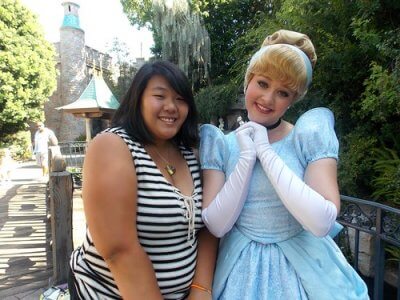The Cinderella Complex – When a Secret Need to be Saved Ruins Everything
by Andrea M. Darcy
Are you an ambitious sort? Then you get in a relationship, and your career dives or stalls? Or have you led your life on hold, waiting for someone else to inspire you? The Cinderella complex might be your problem.
What is the Cinderella Complex?
The Cinderella complex is a hidden desire to be saved. Deep down you don’t want to be responsible for yourself, and fear independence.
The term was made popular by author Colette Dowling back in the 1980s, when she published a book of the same name. The idea she proposes is that women are raised to be dependent, and this unconscious need to be protected and saved leads to a constant tendency to sabotage success and happiness.
Just like Cinderella, we deem our own hard work and intelligence as not enough, believing we need an outside force, another person, to arrive and save the day.
The term can really apply to anyone, of any gender, who tends to put their life on hold for other people, unconsciously signalling they want to be saved instead of live from their own power. You want someone else to provide instead of providing for yourself, whether that is financially, mentally, or emotionally.
What are the signs of the Cinderella syndrome?

photo by: Trevor Buntin
At the heart of this issue is a tendency to sabotage your own success in order to stay weak and ‘saveable’. This can look like:
- ‘forgetting’ important things like meetings and deadlines
- Always having sudden drama before a big step forward in life
- changing your mind right before you achieve a goal (‘I’ve decided I don’t really want that job after all’).
It can involve feelings of need and dependency:
- feeling panicky at thought of your partner leaving or dying
- never feeling like anything is enough
- a sense of emptiness.
And it can involve a cycle where you are strong and savvy when alone, but morph when you get in a relationship. This can see you:
- focus less on your career
- stop making decisions for yourself
- spend more time pleasing your partner than yourself
- become a caretaker, suddenly cooking and cleaning more than usual
- suddenly have money issues and need them to take charge
- keep getting ‘sick’ with, for example, ongoing flu and colds
- stop your hobbies and interests and engage in your partner’s instead
- staying even if it’s obviously a dysfunctional relationship.
And then it involves rescue fantasies.
Deep down, if you are honest with yourself, you are waiting. Waiting for that ‘someone’ to come along who makes everything okay. Who makes everything make sense. Who makes you want to be you.
Why do I have this hidden need to be saved?
 The world has ostensibly evolved and moved on since Dowling wrote the Cinderella Complex.
The world has ostensibly evolved and moved on since Dowling wrote the Cinderella Complex.
But not for everybody. Many of us still grew up with a family that, knowingly or not, encouraged us to be dependent instead of independent.
For someone who identifies as female, this could look like being raised with ‘traditional values’. Where it’s boys who are brave. Girls are to be good and sweet. If you weren’t taught to face fear as a child, if you were subject to jokes about how you’d make a good wife and mother, or to marry rich, then you were not fed the idea that you are a strong person who will take charge of her own life.
For men, you might be okay to provide for yourself financially, but you could struggle to provide for yourself mentally and emotionally. This can happen if you were a ‘mummy’s boy’. If all your decisions were made for you, and you were never taught to think for yourself, or dare to be different.
So I’m supposed to stay independent?
The Cinderella complex is one end of a spectrum, and many of us swing wildly from one side to the other in a reactive cycle. In a relationship we are strangely needy and panicky. If the relationship then ends, we become overly independent. We never ask for help, and we push ourselves to achieve.
We react to our own need and our own shame, and find ourselves never stable or certain of ourselves.
This happens because neither dependency or independency are that healthy in and of themselves. Dependency can lead to codependency (getting our entire sense of self from another instead of sourcing it from within). Fierce independency leads to what psychologists call ‘counter-dependency’ where we isolate ourselves from others, pushing away any threat to our seeming autonomy.
So then what’s the healthy answer?
The power of counter-dependency
Like most things, the best way doesn’t lie in extremes, but in the middle.
Counter-dependency means we depend on each other not from a place of need or desperation, but from a place of desire and feeling grounded.
It’s a sharing sort of dependency. “I know I can survive and thrive by myself, I take good care of myself and provide for myself. But I choose to depend on you at times and let you depend on me in return”.
It’s of course essential that both parties can easily be independent and have a healthy relationship with themselves. Or it’s not really counter dependency.
But how do I end my Cinderella Complex?
It’s not a matter of just ‘deciding’ you’ll stop throwing away your personal power when love comes knocking.
The Cinderella complex comes from deeply ingrained ways of seeing yourself and the world, and from unconscious beliefs that have been there since childhood.
So it takes time, commitment, and hard work to change. This can include things like:
- recognising what values you grew up with and what values are yours
- and what core beliefs you actually have about yourself
- being honest about what your needs are and finding healthy ways to get them met
- identifying and healing past situations that hurt your self-esteem
- recognising who you really are and what you really want
- learning to relate in honest ways instead of power games.
There are many self-help books which can be a great start, as can internet groups and forums. But given how intricately attached the Cinderella complex is with our sense of self and our primary relationships growing up, it can be very helpful to work with a therapist. Not least as therapy is a sort of relationship, and can act as a sort of model to show us our own need to be dependent, plus be a safe space to try out new ways of relating.
Pretty sure this is you? And it’s time to claim your personal power? We connect you with top London-based therapists. Or use our booking site to find UK-wide registered therapists now.
 Andrea M. Darcy is a mental health and wellbeing expert, who has done some training in person-centred counselling and coaching. She often writes about trauma, relationships, and ADHD, and advises people on how to plan their therapy journey. Find her on Instagram @am_darcy
Andrea M. Darcy is a mental health and wellbeing expert, who has done some training in person-centred counselling and coaching. She often writes about trauma, relationships, and ADHD, and advises people on how to plan their therapy journey. Find her on Instagram @am_darcy






Wow. Nice way to tell us Asian people that we were originally molded just to be codependent with others in a matter of relationships. Then the quote “I’m just a girl” can be applied here, naurrr way. Thanks for spreading awareness about this complex.
Thank you for posting this. While I’ve made much headway in years of therapy, I’m still on this recovery journey and it’s exhausting. I worked through your values test (what are my values? What are their values that are not mine?), which caused in me an incredible feeling of lightness and openness. This practice is very helpful for my self-esteem work. Thank you again